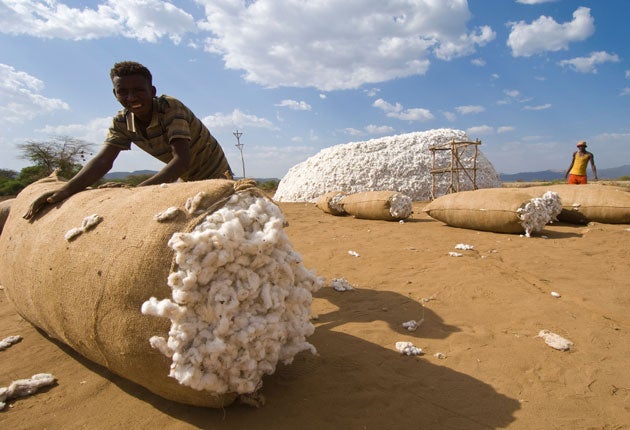West's billions in subsidy shut out African cotton growers

Your support helps us to tell the story
From reproductive rights to climate change to Big Tech, The Independent is on the ground when the story is developing. Whether it's investigating the financials of Elon Musk's pro-Trump PAC or producing our latest documentary, 'The A Word', which shines a light on the American women fighting for reproductive rights, we know how important it is to parse out the facts from the messaging.
At such a critical moment in US history, we need reporters on the ground. Your donation allows us to keep sending journalists to speak to both sides of the story.
The Independent is trusted by Americans across the entire political spectrum. And unlike many other quality news outlets, we choose not to lock Americans out of our reporting and analysis with paywalls. We believe quality journalism should be available to everyone, paid for by those who can afford it.
Your support makes all the difference.Western governments are rigging the market against poor cotton growers in Africa by pouring billions of pounds of taxpayers' money into farms in the United States and Europe, according to a new report today.
The US and EU have handed cotton farms subsidies of $32bn (£20bn) in the past decade, disadvantaging otherwise cheaper West African imports, according to the report by the Fairtrade Foundation.
China, the biggest cotton producer in the world, has also propped up its farmers with $15.4 billion (£9.5 billion) since the deadlocked Doha trade talks began in 2001.
The report, The Great Cotton Stitch Up, complained the payments were "distorting" the world market for the most used natural fibre in the world. While cotton should be the "white gold" that lifted 10 million farmers in West Africa out of poverty, they were engaged in a daily battle to survive, the report said, quoting Oxfam's calculation that the payments cost the four "C4" states of Benin, Burkina Faso, Chad and Mali £155m a year.
The Fairtrade Foundation published the report two days before the European Commission is due to announce proposals for reforming the Common Agricultural Policy which subsidises farmers. Brussels is not expected to change the cotton regime.
Global cotton prices have almost doubled since the summer to a 15 year high of $1.39 a pound last week, because of floods in China and Pakistan, two big producers, bad weather in the US and an export ban in India. The increase has promped British retailers Next, New Look and Primark to warned the cost of clothing in the shops will increase.
Despite the rise, West African farmers are unlikely to raise production because they have been badly stung by the collapse in world prices over the past 30 years, according to the report. It said subsidies had worsened their situation. Since 2001, the US has spent the most on subsidy, $24.4 billion – 51 per cent of the global total – paying 3,500 farmers in southern states such as Arizona, Georgia, Mississippi, and Texas. According to the report, a powerful US cotton lobby funds US politicians who have maintained the paymen ts.
Brussels spent $6.9bn on supporting 100,000 small cotton growers, mostly in Greece, paying $2.51 per pound of cotton, more than the market price. Last year the EU subsidy per pound of cotton was 10 times higher than the US rate. If trade barriers were removed, Fairtrade said, production would fall in subsidised regions and rise in West Africa.
Average income per head in the C4 states is $637. "Cotton is our only income. These [US subsidies] are the reason we're not producing as much cotton. Mali cotton farmers are hardly able to cover their living costs," said Douda Samake, secretary of a cotton co-operative in Mali. "It's the main export for Mali and the state does not have funds to pay for healthcare and education."
The Fairtrade Foundation is calling for the EU to scrap cotton subsidies, in a move that would isolate the US. Harriet Lamb, its executive director, said: "It is incredible that EU cotton subsidies are worth more per pound than what cotton trades for on global markets. This is why we are calling on the EU to eliminate its cotton trade distorting subsidies."
In a foreword to the report, Vince Cable, the Business Secretary, committed Britain to work towards ending the distortion. He said: "The current system of subsidies cannot be right and certainly is not fair."
Join our commenting forum
Join thought-provoking conversations, follow other Independent readers and see their replies
0Comments